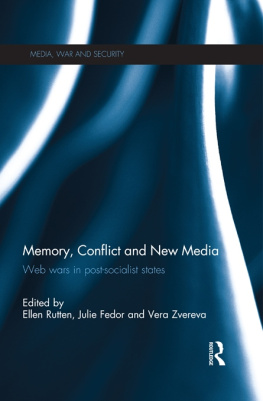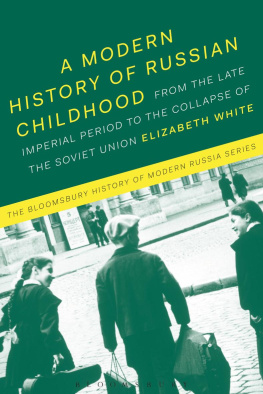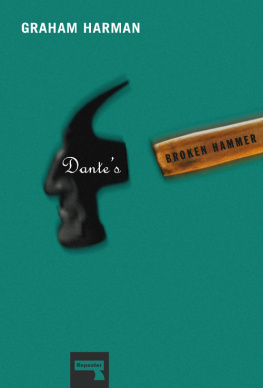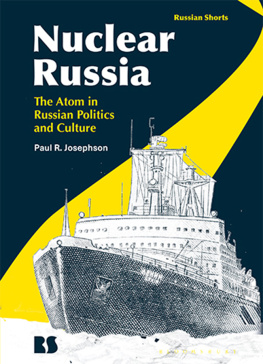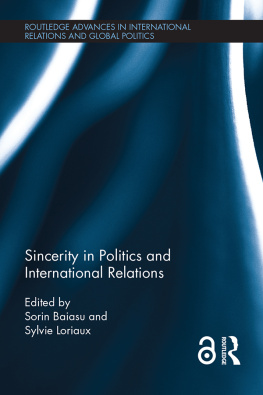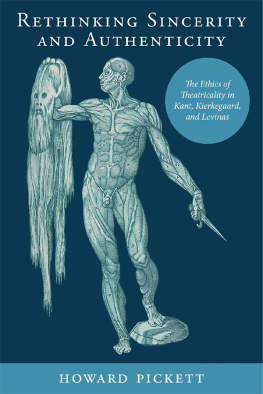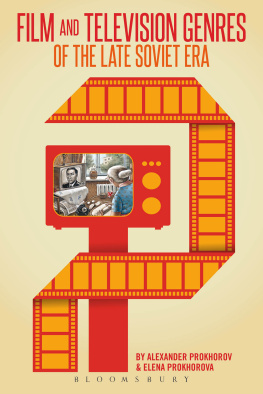SINCERITY AFTER COMMUNISM
EURASIA PAST AND PRESENT
General Editors
Catriona Kelly
University of Oxford
Douglas Rogers
Yale University
Mark D. Steinberg
University of Illinois
ELLEN RUTTEN
Sincerity after Communism
A CULTURAL HISTORY

Copyright 2017 by Ellen Rutten.
All rights reserved.
This book may not be reproduced, in whole or in part, including illustrations, in any form (beyond that copying permitted by Sections 107 and 108 of the U.S. Copyright Law and except by reviewers for the public press), without written permission from the publishers.
Yale University Press books may be purchased in quantity for educational, business, or promotional use. For information, please e-mail (U.K. office).
Set in Scala and Scala Sans type by Westchester Publishing Services.
Printed in the United States of America.
Library of Congress Control Number: 2016943768
ISBN 978-0-300-21398-0 (hardcover : alk. paper)
A catalogue record for this book is available from the British Library.
This paper meets the requirements of ANSI/NISO Z39.48-1992 (Permanence of Paper).
10 9 8 7 6 5 4 3 2 1
CONTENTS
PREFACE
There was this fashion among spin doctors: The new sincerity.... The idea is that, allegedly, attempts are constantly being made trying to lead us Russian nationalists down a false patheither by lulling us to sleep alongside Mongols and Jews, or luring us into the dark webs of Byzantinism. But in truth, what Russian nationalism constitutes is very simple: that the trains in Russia should run on time, that civil servants stop demanding bribes, that judges stop listening to phone calls, that crude businessmen stop exporting money to London, that policemen can live off their wages.
Viktor Pelevin, S.N.U.F.F. (2011)
This book explores contemporary cultural production and consumption processesprocesses in which anxieties about artistic, commercial, and political sincerity take center stage. Writers and poets, bloggers, artists, filmmakers, (fashion) designers, critics, political commentators, PR experts: today they rarely tire of asking whether or not such-and-such a person or phenomenon is being genuinely honest. Is U.S. President Obama reviving sincerity in democratic politics? Are Danish films exemplifying a move away from postmodern sarcasm to a neo-sincerity? Is Russian opposition blogger Aleksei Navalny truly politically engaged, or is he introducing a public new sincerity that is primarily career driven?
A new art-house film or collection of poems, the practice of bowling, a new Nike design, My Little Pony merchandise: in our age, there are few phenomena that have not been linked at some point or other to visions of a newly born (and, according to most commentators, emphatically post-postmodern or post-ironic) sincerity. Symptomatic of the omnipresence of the notion is the epigraph with which this preface begins. It comes from a novel by Russian cult writer Viktor Pelevin, who never misses a chance to parody pop-culture hypes. Pelevins satirical definition of the new sincerity boils down to a detailed social diagnosisone that, linking transport timetables to commercial activities and legislative systems, encompasses multiple layers of post-Soviet public life.
How should we understand the current infatuation with being true to oneself? And what does todays preoccupation with reviving sincerity tell us about contemporary society? These and related questions lie at the heart of this book, which monitors the ongoing public debate on revitalizing sinceritythat hard-to-monitor virtue of being oneself or speaking truly of ones private feelings.
As the above set of examples illustrates, the debate in question is not limited to one particular world region. Discussions on the question What is sincerity today?and, in a related query, What follows after postmodern relativism?do not capture the minds only of Western intellectuals. They are inquiries that have stirred heated debates in myriad countriesand there is, perhaps, no better place to start a quest into the discussions non-Western hypostases than Russia, a society whose more highly educated residents have long harbored an obsessive interest in sincerity. What does it mean to be sincere and to respect the truth? This question has haunted Russian intellectuals with particular force since Stalins deathbut it began to make its mark on public discussions on selfhood in Russia long before Stalin entered the scene.
This book tracks the Russian infatuation with sincerity, paying special attention to its more recent manifestations, in perestroika-era and post-Soviet Russia. Its first outlines date back to a hot July afternoon in 2001. That day, in the solemn aula of the Dutch University of Groningen, I heard professor of literary studies Liesbeth Korthals Altes use her inaugural speech to map new literary-cultural trends. Korthals Altes observed in recent Anglo-American and French literature a clear bias... towards sincere writing, engagement, and solidarity with those whom society excludes, towards a language whose rawness is supposed to guarantee authenticity. These types of books have, of course, always been written. What is new is that they now enjoy success among renowned publishers and often attract reviews full of praise from eminent critics.
Korthals Altes concluded her speech by pointing to an ethical turn in Anglo-American literary scholarshipone that was set in motion in the 1980s and that refuted the all-pervading irony and relativism of which critics accused postmodernism.
That same summer, I had been reading analyses of contemporary culture by the Russian cultural theorist Mikhail Epstein. He similarly spoke of a new sincerity in recent poetry. In his words, recent Russian writings displayed a tendency where the lyrical project reemerges on the vehicle of antilyrical matter, refuse from the ideological kitchen, wandering conversational clichs, elements of foreign lexicon.
As divergent as Epsteins and Korthals Altess views on new cultural developments are, they both single out the concept of a renewed sincerity. In the months and years that followed, I started tracking usage of this phrase and thinking about sincerity today. First I did so out of plain sympathy for the notion of a new sincerity in contemporary culture and art, but gradually my gaze became that of a more critical analytical observer.
The pages that follow focus on literature and new media but also monitor developments in art, design, fashion, film, music, and architecture. They are not an attempt to prove that sincerity has actually undergone a rebirth in contemporary (Russian and global) culture. Nor do they argue that we are at the dawn of a new age, or that such-and-such an artist can unmistakably be identified with an emerging new sincerity or post-postmodernism. These categorical assertions are not the types of insights that interest me. What does interest me is the critical debate that has built up around sincerity in recent decades, and the insights that this debate offers us into the emotional and cultural preoccupations of today. I focus especially on its outlines in Russia, where the concept has in recent years attracted disproportionate attentionbut the Russian story interests me emphatically as part of the larger, transnational story of a new or reborn sincerity. Within that story, I analyze three discursive threads that, during my observations, struck me with particular force: those tackling questions of cultural memory, of commodification, and of mediatization. In monitoring these strands of the debate, my analyses contribute to our understanding of more than just sincerity rhetoric as such. They challenge the traditional narrative of (Russian) postmodernism, in highlighting the considerable attention that, from the start, postmodern artists paid to concerns about honest expression and reaching readers. They redress thinking on the Russian literary field, introducing emotion as a powerful analytical tool for unraveling post-Soviet literary and artistic dynamics. Last but certainly not least, they constitute a plea to move beyond Western paradigms in theoretical reflection on post-postmodernism, authenticity, and mediatization.
Next page

